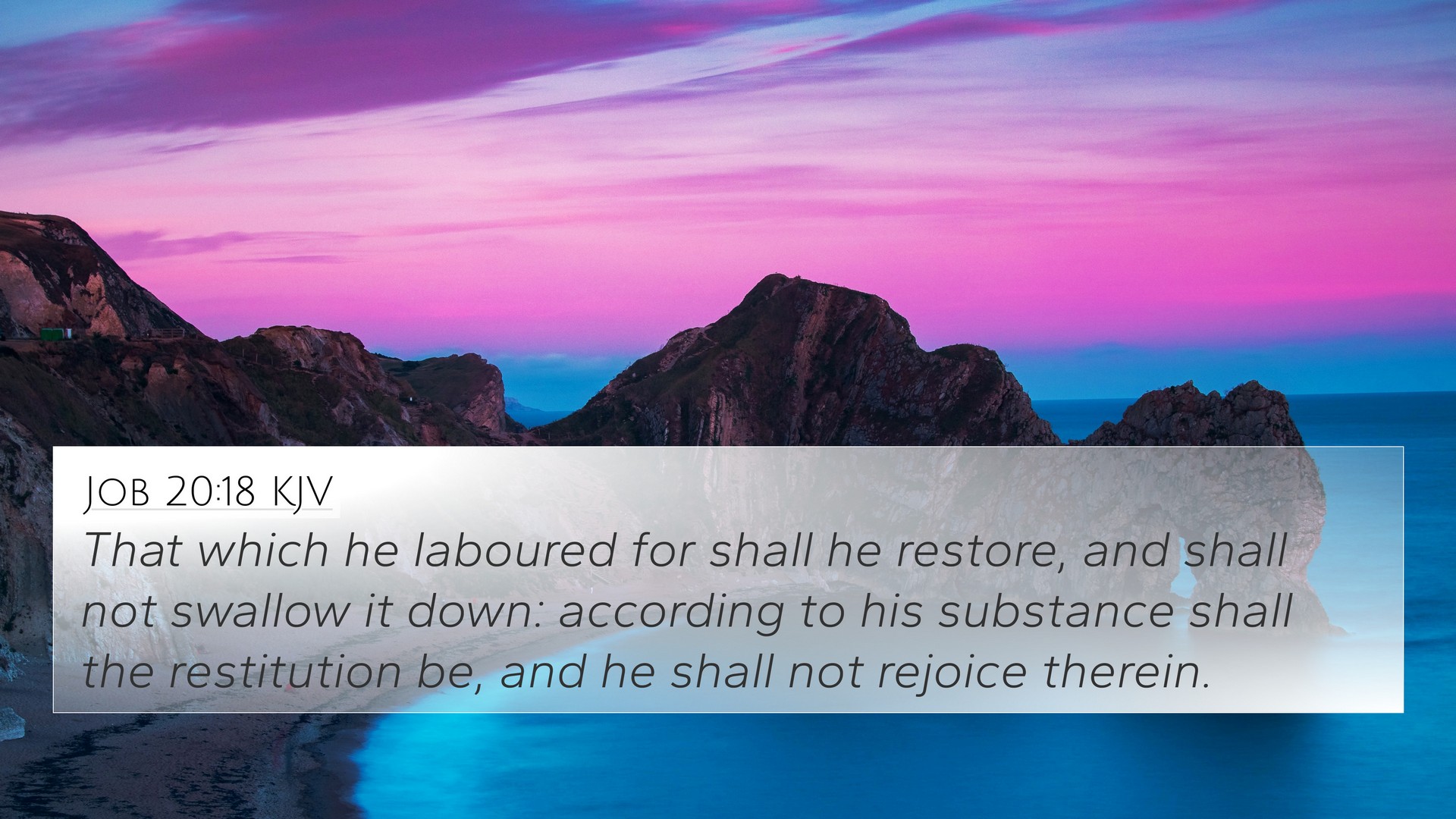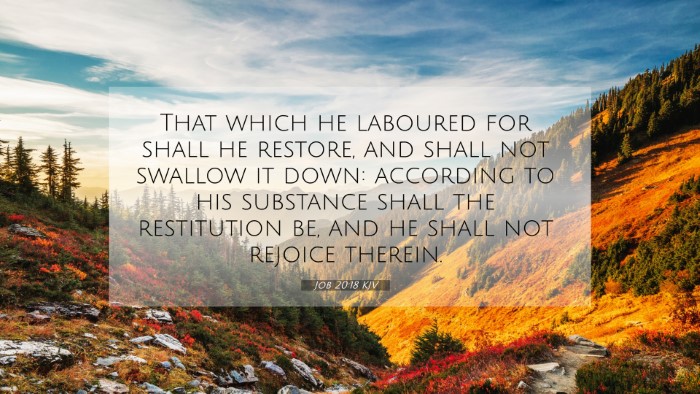Old Testament
Genesis Exodus Leviticus Numbers Deuteronomy Joshua Judges Ruth 1 Samuel 2 Samuel 1 Kings 2 Kings 1 Chronicles 2 Chronicles Ezra Nehemiah Esther Job Psalms Proverbs Ecclesiastes Song of Solomon Isaiah Jeremiah Lamentations Ezekiel Daniel Hosea Joel Amos Obadiah Jonah Micah Nahum Habakkuk Zephaniah Haggai Zechariah MalachiJob 20:18 Similar Verses
Job 20:18 Cross References
That which he laboured for shall he restore, and shall not swallow it down: according to his substance shall the restitution be, and he shall not rejoice therein.
Uncover the Rich Themes and Topics of This Bible Verse
Listed below are the Bible themes associated with Job 20:18. We invite you to explore each theme to gain deeper insights into the Scriptures.
Job 20:18 Cross Reference Verses
This section features a detailed cross-reference designed to enrich your understanding of the Scriptures. Below, you will find carefully selected verses that echo the themes and teachings related to Job 20:18 KJV. Click on any image to explore detailed analyses of related Bible verses and uncover deeper theological insights.
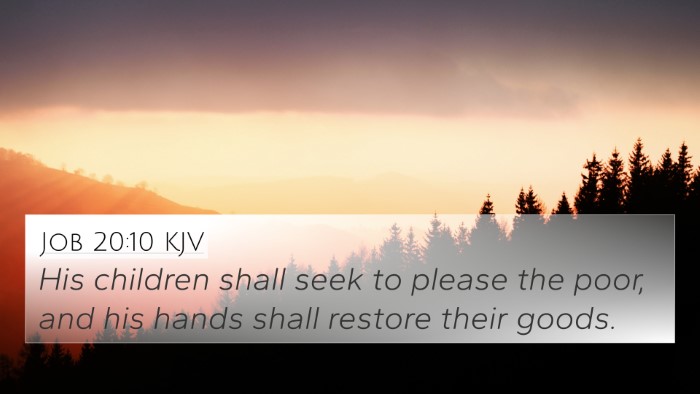
Job 20:10 (KJV) »
His children shall seek to please the poor, and his hands shall restore their goods.
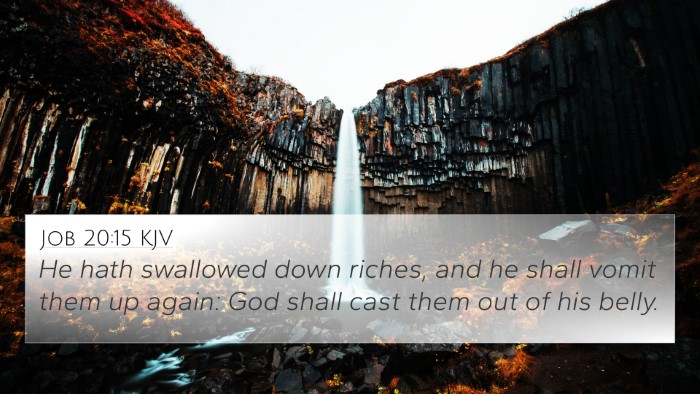
Job 20:15 (KJV) »
He hath swallowed down riches, and he shall vomit them up again: God shall cast them out of his belly.
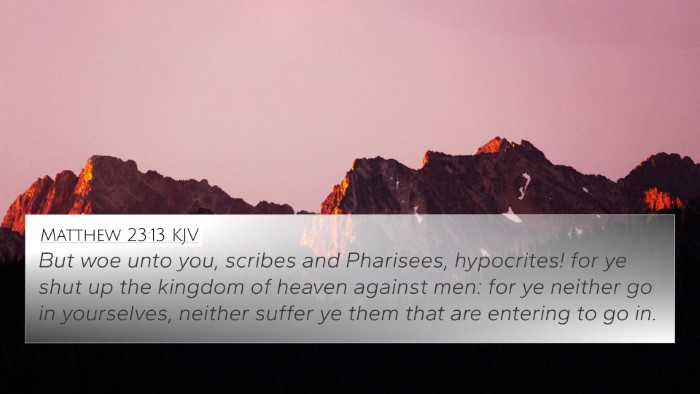
Matthew 23:13 (KJV) »
But woe unto you, scribes and Pharisees, hypocrites! for ye shut up the kingdom of heaven against men: for ye neither go in yourselves, neither suffer ye them that are entering to go in.
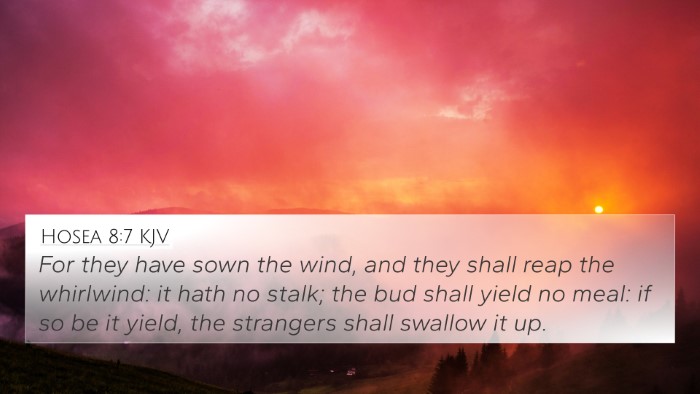
Hosea 8:7 (KJV) »
For they have sown the wind, and they shall reap the whirlwind: it hath no stalk; the bud shall yield no meal: if so be it yield, the strangers shall swallow it up.

Jeremiah 11:15 (KJV) »
What hath my beloved to do in mine house, seeing she hath wrought lewdness with many, and the holy flesh is passed from thee? when thou doest evil, then thou rejoicest.

Jeremiah 22:17 (KJV) »
But thine eyes and thine heart are not but for thy covetousness, and for to shed innocent blood, and for oppression, and for violence, to do it.

Jeremiah 22:13 (KJV) »
Woe unto him that buildeth his house by unrighteousness, and his chambers by wrong; that useth his neighbour's service without wages, and giveth him not for his work;

Jeremiah 51:44 (KJV) »
And I will punish Bel in Babylon, and I will bring forth out of his mouth that which he hath swallowed up: and the nations shall not flow together any more unto him: yea, the wall of Babylon shall fall.

Jeremiah 51:34 (KJV) »
Nebuchadrezzar the king of Babylon hath devoured me, he hath crushed me, he hath made me an empty vessel, he hath swallowed me up like a dragon, he hath filled his belly with my delicates, he hath cast me out.

Proverbs 1:12 (KJV) »
Let us swallow them up alive as the grave; and whole, as those that go down into the pit:
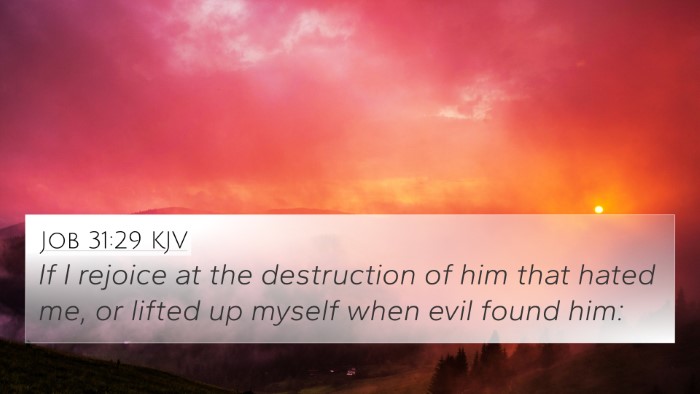
Job 31:29 (KJV) »
If I rejoice at the destruction of him that hated me, or lifted up myself when evil found him:

Job 20:5 (KJV) »
That the triumphing of the wicked is short, and the joy of the hypocrite but for a moment?

Amos 8:4 (KJV) »
Hear this, O ye that swallow up the needy, even to make the poor of the land to fail,

Hosea 9:1 (KJV) »
Rejoice not, O Israel, for joy, as other people: for thou hast gone a whoring from thy God, thou hast loved a reward upon every cornfloor.

Ezekiel 7:12 (KJV) »
The time is come, the day draweth near: let not the buyer rejoice, nor the seller mourn: for wrath is upon all the multitude thereof.

Lamentations 2:16 (KJV) »
All thine enemies have opened their mouth against thee: they hiss and gnash the teeth: they say, We have swallowed her up: certainly this is the day that we looked for; we have found, we have seen it.

James 4:8 (KJV) »
Draw nigh to God, and he will draw nigh to you. Cleanse your hands, ye sinners; and purify your hearts, ye double minded.
Job 20:18 Verse Analysis and Similar Verses
Understanding Job 20:18
The verse Job 20:18 states: "He will restore that for which he labored, and will not swallow it down; according to his substance shall the restitution be." This verse comes in the context of Zophar's discourse, a response to Job's lamentations regarding the suffering he has faced, despite his righteousness.
Summary of Insights from Public Domain Commentaries
The interpretations from various commentaries reveal essential insights into Job 20:18:
- Matthew Henry: He emphasizes the certainty of divine justice. Henry points out that Zophar is addressing a perceived injustice against the wicked, suggesting that ultimately, their ill-gotten gains will be returned to rightful ownership, signifying that God will not allow them to long enjoy their ill gains.
- Albert Barnes: Barnes expands on Zophar's assertion by illustrating that the prosperity of the wicked is temporary. He notes that the restitution of wealth aligns with God's setup of moral order where sinful gains do not last, reinforcing the notion that God's justice prevails. Barnes underscores the idea that the wicked may think they have succeeded, but they will ultimately be deprived of their fortunes.
- Adam Clarke: Clarke's commentary brings attention to the spiritual implication of this verse. He suggests that it is not merely about material wealth, but rather a reflection of spiritual and ethical restitution. Clarke speaks of the ultimate accountability individuals have before God regarding their actions and the consequences that follow.
Thematic connections with other Bible verses
Job 20:18 is rich in thematic connections within the Bible, and understanding these correlations helps to illuminate its meaning further. Here are some relevant cross-references:
- Psalm 37:21: "The wicked borrows and does not repay, but the righteous shows mercy and gives." This verse complements the theme of divine justice and the temporary nature of wicked gains.
- Proverbs 11:18: "The wicked earns deceptive wages, but he who sows righteousness gets a true reward." This highlights the contrast between the outcomes of the wicked and the righteous.
- Luke 16:19-26: The parable of the rich man and Lazarus illustrates the reversal of fortunes after death, echoing the justice principle inherent in Job 20:18.
- Galatians 6:7: "Do not be deceived: God is not mocked, for whatever one sows, that will he also reap." This ties back to Zophar's proclamation about restitution for one's actions.
- James 5:1-3: In this passage, the rich are warned about the fate of their wealth, aligning closely with the idea presented in Job regarding the consequences of wrongful possession.
- Ecclesiastes 5:14: "But those riches perished by evil travail: and he begetteth a son, and there is nothing in his hand." This reflects on how wealth gained unjustly does not last, complementing Zophar's assertion.
- Proverbs 10:2: "Treasures of wickedness profit nothing: but righteousness delivers from death." This verse reinforces the theme that ill-gotten wealth is ultimately worthless.
Insights into Restitution
In the verse, Job’s friend Zophar speaks about restitution—the concept that what the wicked have acquired through deceptive means will eventually be given back. The commentaries highlight various aspects of this idea:
- Retributive Justice: The idea is grounded in divine retribution; God has the ultimate authority to ensure that justice prevails and that the actions of individuals will have corresponding consequences.
- Temporary Enjoyment of Sin: Both Henry and Clarke underscore that those who engage in sin may experience moments of prosperity, but God’s justice will ultimately prevail, indicating that this life is a mere prelude to the eternal reality.
- Spiritual Restoration: Beyond material wealth, there is a deeper spiritual aspect suggesting that one’s relationship with God must be restored as well, emphasizing repentance and moral accountability.
How to Use Cross-Referencing Tools
Understanding and analyzing biblical passages through cross-referencing enhances comprehension and provides richer theological insights. Here are some methods:
- Utilizing a Bible Concordance: A concordance allows you to find verses that share keywords or themes, such as "restoration" or "justice," leading you to more relevant scriptures connected to Job 20:18.
- Employing Cross-Reference Systems: Many Bibles come with built-in cross-references. As you read, make a note of related verses that illuminate themes like divine justice and restitution.
- Engaging in Comparative Bible Verse Analysis: By comparing passages, you can draw connections that reveal consistent themes across both Old and New Testaments.
Conclusion
Job 20:18 serves as a powerful reminder of the moral order established by God, emphasizing that temporal success achieved through unrighteousness will not stand. The comprehensive analyses from various commentaries, combined with the thematic connections to other biblical texts, provide invaluable insights into this verse's profound meanings. Engaging with cross-references enhances understanding and invites deeper exploration of scripture, enriching one's spiritual journey.
